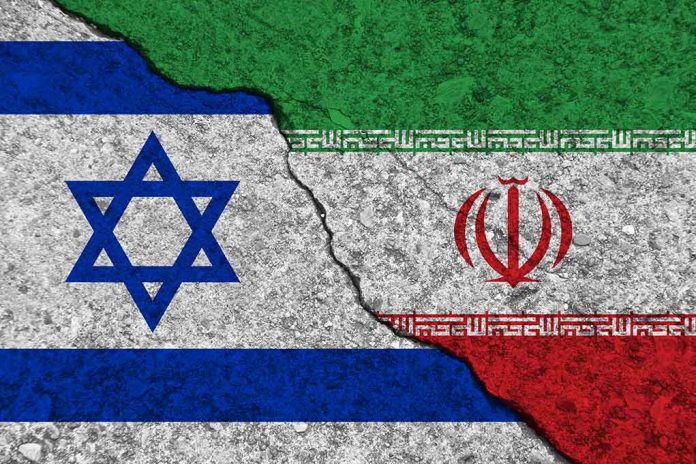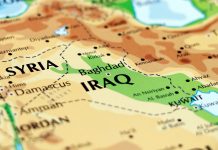
Netanyahu assures Biden: Israel to target only military sites in Iran, avoiding nuclear and oil facilities.
At a Glance
- Netanyahu promises to strike only Iranian military targets, not nuclear or oil sites
- Decision follows US warnings against destabilizing global energy markets
- Israel’s response to Iran’s missile attack remains undisclosed
- US offers support but expects limited direct involvement
- Tensions persist in the region, with ongoing operations in Gaza and Lebanon
Netanyahu’s Strategic Shift: Targeting Iranian Military
Israeli Prime Minister Benjamin Netanyahu has reportedly assured the Biden administration that Israel will only target military sites in a potential counterstrike against Iran. This decision comes in the wake of Iran’s launch of approximately 180 missiles into Israel on October 1, following Israeli airstrikes in Lebanon targeting Hezbollah leaders. The move represents a significant shift in Israel’s military strategy, aimed at curtailing Iranian aggression while avoiding broader economic or nuclear implications.
The decision to focus on military targets follows explicit US warnings against striking Iran’s nuclear or oil facilities. This cautious approach aligns with regional security concerns and aims to prevent destabilization of global energy markets. US President Joe Biden, while congratulating Netanyahu on Israel’s operations against Hezbollah, has not approved a counterstrike on Iran’s nuclear sites, underscoring the delicate balance of power in the region.
Benjamin Netanyahu has told Washington that Israel will attack Iran's military facilities, not nuclear or oil facilities.
/Washington Post/ pic.twitter.com/Ofw1knOvUI— S p r i n t e r (@SprinterFamily) October 14, 2024
US Concerns and Support
The Biden administration’s concerns extend beyond immediate military considerations. There are worries about the potential economic impact of a strike on Iran’s oil facilities, particularly regarding oil prices and their influence on the upcoming US presidential election. In response to the escalating tensions, the US is bolstering Israel’s defenses by sending a Terminal High Altitude Area Defense battery to enhance its missile defense capabilities.
Despite these supportive measures, the US has not been fully briefed on Israel’s specific plans for retaliation. Defense Secretary Lloyd Austin and Israeli Defense Minister Yoav Gallant have discussed potential responses, but Israel has not shared its final decision. This lack of concrete assurances has made the US less likely to take an active role in any retaliatory action.
Regional Tensions and Ongoing Operations
While the focus remains on potential actions against Iran, Israel continues its military operations in other areas. In Lebanon, Israel has been accused by the UN of illegally entering a peacekeeping base. Simultaneously, in northern Gaza, Israel has intensified its offensive and ordered civilian evacuations, raising concerns about civilian safety and potential humanitarian crises.
The situation remains fluid, with Israel narrowing down its response options. These could include targeting Iranian military and intelligence infrastructure, air defenses, and energy facilities. However, the timing and exact nature of Israel’s response remain uncertain, with Netanyahu vowing to act but not specifying when or how.
International Diplomacy and Future Implications
The international community is closely watching these developments. The US and Iran have communicated that neither side wants the conflict to escalate further. However, the US is considering additional sanctions against Iran and monitoring for clues about the timing of Israel’s response. There is historical precedent for Israel conducting military actions while senior leaders are abroad, adding an element of unpredictability to the situation.
As tensions persist, the global community remains on edge, with potential implications for regional stability, international diplomacy, and global energy markets. Netanyahu’s strategic decision to target only military sites represents a calculated move to address security concerns while navigating complex international relationships and economic considerations.
Sources:
- https://www.reuters.com/business/energy/oil-prices-drop-2-demand-concerns-israel-comments-2024-10-15/
- https://www.euronews.com/2024/10/15/netanyahu-will-only-strike-military-targets-in-iran-reports-say
- https://www.nbcnews.com/investigations/israel-not-briefed-us-military-officials-plans-retaliation-iran-rcna174443
- https://www.reuters.com/world/middle-east/israel-will-listen-us-make-own-decisions-netanyahus-office-says-2024-10-15/
- https://www.ajot.com/news/oil-plunges-4-as-iran-supply-disruption-concerns-ease-demand-outlook-weakens
- https://m.economictimes.com/news/defence/israel-vows-to-put-national-interest-first-in-response-to-iran-attack/articleshow/114249930.cms
- https://www.aljazeera.com/news/2024/10/11/us-imposes-sanctions-on-irans-oil-sector-over-missile-attack-on-israel
- https://oilprice.com/Latest-Energy-News/World-News/Israel-Is-Weighing-US-Concerns-Before-Retaliating-to-Iranian-Attacks.html
- https://www.cnbc.com/2024/10/03/oil-prices-could-soar-if-israel-targets-irans-energy-infrastructure.html
- https://www.timesofisrael.com/liveblog_entry/netanyahu-told-biden-he-wont-attack-iranian-oil-nuclear-sites-report/










